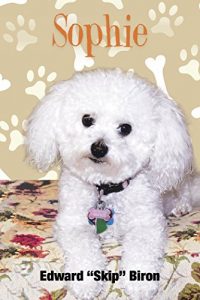A dog can become almost human, according to author Edward “Skip” Biron, presenting a darling Bichon Frise as an excellent example in his non-fiction book, Sophie.
Being a rare breed, Sophie was rather expensive, but the woman destined to become her owner and best friend – Polly Pelletier – was very lonely, having recently moved from Maine to Washington state after a bad marriage. Working from home and rarely going out, she used a website for picking the best breed of dog for one’s personality, purposely describing herself as nearly impossible to get along with. “The answer came back: Bichon Frise!”
Polly’s sense of isolation was acute when she ordered Sophie, picking her up at the airport in the middle of the night and pleased to see that the dog is already perfectly litter trained. These pure white, fluffy little dogs with “black, lustrous eyes” are known for their hypoallergenic non-shedding coat, “smiling” faces, and close companionship with human owners, so she was a perfect match for Polly.
Biron touches on the history of the breed – how they’re native to the Canary Islands, and had been carried overseas by Spanish sailors, catching the eye of many great painters, and were first bred in the United States in the 1950s. More could have been done with this material to make it a full-fledged look at the breed, but then this is Sophie’s story, not the history of the Bichon Frise.
Throughout the course of the book, we learn every detail of Sophie’s life – it’s very much like the biography of a dog, as if written about a person. Such is Biron’s affection for Sophie, and his enthusiasm is infectious. We learn how she is leery of taking treats from strangers, even the vet, and makes a good watchdog, alerting her owners to possible intruders with a low bark or growl.
At times, Biron lets Sophie do the talking, and that is when the book is at its most charming. Sophie considers herself a celebrity at Polly’s apartment complex; her habit of sitting outside with Polly in her rocking chair brings them many friends, including Skip himself. Sophie often entertains Polly and Skip (at one time the dogs were used as circus or street performers), such as making a broad jump over minor obstacles in the house. The threesome often visit nursing homes where the little dog’s endearing antics prove to be a comfort to many. She is often welcomed in places that don’t usually allow dogs.
One result of telling the story from Sophie’s point of view is that when the story moves on to more-troubling issues, such as Sophie’s illness (a seizure disorder typical of the breed) and her increasing years, we have Sophie’s humor to buoy up the rather gloomy events: “Actually, I don’t feel a day over forty!” This is a feel-good book through and through.
As catalogued by an adoring observer, Sophie’s many “almost human” qualities will delight anyone who lives with a Bichon Frise, and may attract prospective owners to this amiable breed.
STAR RATING
Design
Editing
Content
Get an Editorial Review | Get Amazon Sales & Reviews | Get Edited | Get Beta Readers | Enter the SPR Book Awards | Other Marketing Services
























Leave A Comment